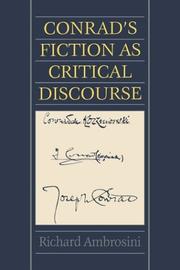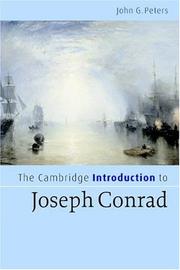| Listing 1 - 3 of 3 |
Sort by
|

ISBN: 0521403499 0521067243 0511983891 9780511983894 9780521403498 9780521067249 Year: 1991 Publisher: Cambridge Cambridge University Press
Abstract | Keywords | Export | Availability | Bookmark
 Loading...
Loading...Choose an application
- Reference Manager
- EndNote
- RefWorks (Direct export to RefWorks)
Joseph Conrad's comments about his works have commonly been dismissed as theoretically unsophisticated, while the critical notions of James, Woolf and Joyce have come to shape our understanding of the modern novel. Richard Ambrosini's study of Conrad's Fiction as Critical Discourse makes an original claim for the importance of his theoretical ideas as they are formed, tested, and eventually redefined in Heart of Darkness and Lord Jim. Setting the narrator's discourse in these tales in the context of the dynamic interplay of Conrad's fictional with his non-fictional writings, and of the transformations in his narrative forms, Ambrosini defines Conrad's view of fiction and the artistic ideal underlying his commitment as a writer in a new and challenging way. Conrad's innovatory techniques as a novelist are shown in the continuity of his theoretical enterprise, from the early search for an artistic prose and a personal novel form, to the later dislocations of perspective achieved by manipulation of conventions drawn from popular fiction. This reassessment of Conrad's critical thought offers a new perspective on the transition from the Victorian novel to contemporary fiction.
Conrad, Joseph --- Arts and Humanities --- Literature --- Didactic fiction, English --- Discourse analysis, Literary. --- History and criticism. --- Conrad, Joseph, --- Criticism and interpretation. --- Aesthetics. --- Literary discourse analysis --- Rhetoric --- Literary style --- Korzeniowski, Józef Konrad Teodor, --- Korzeniowski, Joseph Conrad Theodore, --- Konrad, Dzhozef, --- Kʻang-la-te, --- Conrad-Korzeniowski, Joseph, --- Korzeniowski, Joseph Conrad-, --- Kʻonradŭ, Josep, --- Kʻonradŭ, Chosep, --- Kʻolladŭ, Josep, --- Konrad, Dzd. --- Conrad, Józef, --- קונראד, ג׳וזף, --- קונראד, ג׳וסף --- קונרד, ג׳וזף --- קונרד, ג׳וזף, --- קונרד, יוסף --- 康拉德, --- Konrad Nalecz Korzeniowsky, Jozef Tedor, --- Konrant, Tzozeph,

ISBN: 0521548675 9780521548670 0521839726 9780521839723 9780511607264 9780511335112 0511335113 9780511331893 0511331894 9780511339271 0511339275 0511333870 9780511333873 0511334532 9780511334535 0511607261 1107162572 1281040185 9786611040185 0511333196 0511567251 Year: 2006 Publisher: Cambridge Cambridge University Press
Abstract | Keywords | Export | Availability | Bookmark
 Loading...
Loading...Choose an application
- Reference Manager
- EndNote
- RefWorks (Direct export to RefWorks)
Joseph Conrad is one of the most intriguing and important modernist novelists. His writing continues to preoccupy twenty-first-century readers. This introduction by a leading scholar is aimed at students coming to Conrad's work for the first time. The rise of postcolonial studies has inspired interest in Conrad's themes of travel, exploration, and racial and ethnic conflict. John Peters explains how these themes are explored in his major works, Nostromo, Lord Jim and Heart of Darkness, as well as his short stories. He provides an essential overview of Conrad's fascinating life and career and his approach to writing and literature. A guide to further reading is included which points to some of the most useful secondary criticism on Conrad. This is a most comprehensive and concise introduction to studying Conrad, and will be essential reading for students of the twentieth-century novel and of modernism.
Conrad, Joseph --- 820 "19" CONRAD, JOSEPH --- 820 "19" CONRAD, JOSEPH Engelse literatuur--20e eeuw. Periode 1900-1999--CONRAD, JOSEPH --- Engelse literatuur--20e eeuw. Periode 1900-1999--CONRAD, JOSEPH --- Conrad, Joseph, --- Korzeniowski, Józef Konrad Teodor, --- Korzeniowski, Joseph Conrad Theodore, --- Konrad, Dzhozef, --- Kʻang-la-te, --- Conrad-Korzeniowski, Joseph, --- Korzeniowski, Joseph Conrad-, --- Kʻonradŭ, Josep, --- Kʻonradŭ, Chosep, --- Kʻolladŭ, Josep, --- Konrad, Dzd. --- Conrad, Józef, --- קונראד, ג׳וזף, --- קונראד, ג׳וסף --- קונרד, ג׳וזף --- קונרד, ג׳וזף, --- קונרד, יוסף --- 康拉德, --- Konrad Nalecz Korzeniowsky, Jozef Tedor, --- Konrant, Tzozeph, --- Criticism and interpretation. --- Arts and Humanities --- Literature
Multi
ISBN: 9048534119 9789048534111 9789462983748 9462983747 Year: 2019 Volume: 16 Publisher: Amsterdam: Amsterdam university press,
Abstract | Keywords | Export | Availability | Bookmark
 Loading...
Loading...Choose an application
- Reference Manager
- EndNote
- RefWorks (Direct export to RefWorks)
Satire, Veneration, and St. Joseph in Art, c. 1300-1550 is the first to reclaim satire as a central component of Catholic altarpieces, devotional art, and veneration, moving beyond humor's relegation to the medieval margins or to the profane arts alone. The book challenges humor's perception as a mere teaching tool for the laity and the antithesis of 'high' veneration and theology, a divide perpetuated by Counter-Reformation thought and the inheritance of Mikhail Bakhtin (Rabelais and His World, 1965). It reveals how humor, laughter, and material culture played a critical role in establishing St. Joseph as an exemplar in western Europe as early as the thirteenth century. Its goal is to open a new line of interpretation in medieval and early modern cultural studies, by revealing the functions of humor in sacred scenes, the role of laughter as veneration, and the importance of play for pre-Reformation religious experiences.
Altarpieces. --- Art, Renaissance. --- Christian art and symbolism. --- Laughter in art. --- Satire in art. --- ART / History / Renaissance. --- Art, Christian --- Art, Ecclesiastical --- Arts in the church --- Christian symbolism --- Ecclesiastical art --- Symbolism and Christian art --- Religious art --- Symbolism --- Symbolism in art --- Church decoration and ornament --- Art, Renaissance --- Renaissance art --- Predellas --- Reredos --- Retables --- Screens (Church decoration) --- Joseph, --- Giuseppe, --- José, --- Józef, --- Yūsuf, --- In art. --- Art, Medieval. --- Altarpieces, Renaissance. --- Altarpieces, Medieval. --- Satire --- Religious aspects. --- Ecclesiology --- History of Europe --- satire [artistic device] --- altarpieces --- saints --- ancestor worship --- Joseph of Nazareth --- anno 1300-1399 --- anno 1400-1499 --- Art. --- Humor. --- Satire. --- St. Joseph. --- Veneration. --- Christian art and symbolism --- Satire in art --- Laughter in art --- Retables de la Renaissance --- Retables médiévaux --- Aspect religieux. --- Joseph --- in art. --- Satire - Religious aspects. --- Ioseph sponsus B.M.V. --- Iconographie --- Joseph, - Saint - In art. --- Joseph, - Saint --- Retables médiévaux
| Listing 1 - 3 of 3 |
Sort by
|

 Search
Search Feedback
Feedback About UniCat
About UniCat  Help
Help News
News